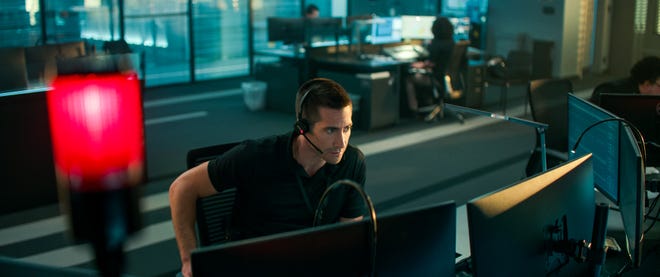Director Antoine Fuquahas made some noteworthy police thrillers in his career. But having to craft his latest while quarantined in a van away from his star during a pandemic was a new experience.
“I can tell you the biggest lesson is probably don’t do it,” says the “Training Day” filmmaker, laughing as he discusses his taut and intense Netflix film “The Guilty” (streaming Friday on Netflix). Filming over 11 days last October, Fuqua had the chance to explore the mental health aspect of law-enforcement life that he hasn’t before, though under nerve-wracking circumstances because ofCOVID-19 protocols.
“The Guilty” stars Jake Gyllenhaal as hot-tempered LAPD detective Joe Baylor, busted down to being a 911 dispatch operator after an on-duty incident – and anxiously awaiting a trial appearance the next day. A call comes in from a woman claiming to be in grave danger, leaving Joe scrambling and doing what he can from his work station during a long stressful night that’s as much about helping a stranger as it is finding his own redemption.
‘The Guilty’:Jake Gyllenhaal talks vaccine mandates and riding shotgun for Michael Bay

“He’s confined to a space as a job, but even when the guy comes and says, ‘We’re off,’ he won’t leave,” Fuqua says. “They deal with (911 calls) all day. Why is he obsessed now? What is the thing holding him? And so that’s part of the journey as well to make the audience want to know what that mystery is.”
Production was already destined to be tough amid coronavirus, with Riley Keough, Paul Dano, Ethan Hawke and Peter Sarsgaard calling in from all over the world as characters on the phone Joe deals with through the night.
“There were technical difficulties in the middle of a take that was working,” Gyllenhaal says. “That created its own tension.”
But right before filming was scheduled to start, a person who came in close contact with Fuqua tested positive for COVID-19, so Fuqua was forced to sequester in a van, communicating with Gyllenhaal on a large monitor and the other actors via Zoom on his computer. (The filmmaker’s test ultimately came back negative.)
Ranked:All the best movies we saw at Toronto Film Festival (from ‘Dune’ to ‘The Guilty’)

“Jake used to climb up on the ladder and talk to me from over a wall,” Fuqua recalls. Sometimes right in the middle of “a great performance,” the director would “see something happening with him that only he could hear and he was getting echoes and feedback. And then every once in a while I would get feedback and I’m in a confined space and it would just kill my ears.”
Fuqua, who worked with Gyllenhaal on the 2015 boxing drama “Southpaw,” yearned to be on the set working up close with his crew. Instead, he relied heavily on watching his assistant director through a spy cam, and even simple things like changing lenses or moving the camera a few inches would create frustrating delays.
“I’m looking at the clock and the day’s ticking away,” the filmmaker says. “Every second we’re not filming is a chance someone could get sick. And every (time) we start filming, Jake has to take his mask off and we obviously don’t want him to get sick in general. The movie would be shut down if your only actor got sick or if I got sick. So, yeah, there were some rough days.”
What to watch this weekend:‘Venom’ sequel, ‘Sopranos’ prequel ‘The Many Saints of Newark’
Still, Gyllenhaal adds, “we’re both pretty resilient and we love a challenge. It just reiterated to me that (Fuqua) loves to go dig deep, go for the truth, and he’ll kind of follow me anywhere and I’ll follow him anywhere.”
Fuqua navigated all those problems because he wanted to tell a different story than he has previously about the “complicated” world of policing. “Mental illness is a problem,” he says. “I think the whole country is dealing with that and I don’t think we talk about it enough.
“There’s a tendency to sometimes just say ‘That person’s evil,’ and maybe (they are),” Fuqua adds. “But something else might be wrong that we need to explore. We’ve got a lot of mass shootings. So for me, I haven’t dealt with a film that I feel hit that subject as much as this one directly.”
(He acknowledges that his movies “Training Day” and “Brooklyn’s Finest” tackled mental health “indirectly,” as did Gyllenhaal’s film “End of Watch.”)

Gyllenhaal appreciates the way “The Guilty” wrestles with “how our systems really have a hard time helping people” with jobs like 911 operators.
“They’ll transfer the phone call in a dire situation and then they’ll never know if the person was helped or saved or got through it or what,” Gyllenhaal says. “That is a mental and emotional anguish that, whether or not they’re strong of mind and spirit, has an effect. And I don’t know where they put that at the end of the day. Even if they have a wonderful family and a great life, that’s a lot to handle.
“Things we don’t know, things we don’t normally talk about, that’s prevalent everywhere. The issue of how we help people, particularly mentally, is a lot of what this movie is about.”


